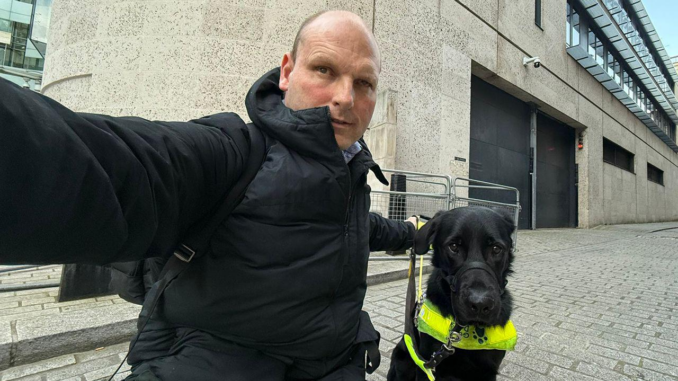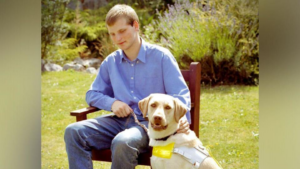
Imagine going about your day, navigating the world with the help of a guide dog, only to be refused service once again. This is a reality that many people with disabilities face daily, and for one individual, it’s become the final straw. After repeatedly encountering discrimination in public spaces, this person has decided to stop speaking out about their experiences. It’s not out of defeat but out of sheer frustration that the law isn’t enough to guarantee basic human rights. In this article, we’ll dive into the challenges faced by people with guide dogs, why this issue persists, and why the refusal of service is not only harmful but a violation of the law.
What is a Guide Dog?
A Lifeline for the Visually Impaired
Guide dogs are specially trained service animals that assist people with visual impairments, helping them navigate their environment safely. These dogs aren’t just pets; they’re life companions and helpers, trained to understand complex commands and obstacles in their path. A guide dog plays a crucial role in helping their owner gain independence, providing freedom to go to work, school, the grocery store, or simply out for a walk.
The Legal Protection of Service Animals
In many countries, including the United States, guide dogs and other service animals are protected by law under the Americans with Disabilities Act (ADA). The law prohibits discrimination against individuals with disabilities and guarantees them the right to be accompanied by their service animals in all public places, including restaurants, stores, and transportation services.
The Struggle of Constant Discrimination
A Daily Battle for Rights
Despite these legal protections, many individuals with disabilities face daily discrimination when trying to access public services with their guide dogs. Time and time again, they are refused service, forced to leave, or even face humiliation for simply trying to go about their day. This has become an all-too-familiar experience for those who rely on service animals.
Why Is This Happening?
There are several reasons why people with guide dogs continue to face discrimination. Some business owners or employees may be unaware of the laws regarding service animals, while others may make assumptions or harbor negative stereotypes about disabled individuals. Sometimes, the refusal stems from fear or a misunderstanding of the guide dog’s role.
The Emotional and Psychological Toll
How Repeated Denials Affect the Disabled Community
Being refused service in public is not just a minor inconvenience. It’s a painful reminder that, despite legal protections, people with disabilities are often still viewed as second-class citizens. For those who rely on guide dogs, the constant battles for equal access can lead to feelings of frustration, isolation, and helplessness. It’s not just the inconvenience of being denied service; it’s the emotional toll that comes with the repeated rejection.
Frustration with the System
For many, the legal protections that exist are often not enough. It’s one thing to know that the law is on your side, but it’s another to have to constantly fight for your rights. After countless incidents of being turned away or treated poorly, it’s easy to see why someone would feel that speaking out no longer brings the change needed. The emotional labor of continuously explaining your rights and standing up for them can feel draining.
When the Law is Not Enough
The Gaps in Enforcement
One of the most significant challenges in this ongoing struggle is the lack of enforcement when laws are violated. While the ADA clearly protects individuals with disabilities, the reality is that not all businesses and service providers are held accountable for their actions. In many cases, there is little to no consequence for refusing service to a person with a guide dog, leaving many disabled individuals feeling as though their rights don’t matter.
The Difficulty of Legal Action
While it’s possible to take legal action against businesses that refuse service to individuals with guide dogs, the process is not always straightforward. Legal battles can be long, costly, and emotionally draining, especially when the discrimination is a recurring issue. This can make individuals feel that speaking out is more of an exhausting burden than an effective tool for change.

Why I’m Done Speaking Out
The Breaking Point: When Silence Becomes the Only Option
After countless incidents of being refused service, this individual has reached their breaking point. The frustration of speaking out, filing complaints, and fighting for basic rights has taken its toll. There’s a sense of powerlessness when laws meant to protect you are routinely ignored. For many, the decision to stop speaking out is not one of giving up—it’s one of self-preservation. It’s about realizing that the emotional and psychological strain of constant battles can no longer be carried.
The Burden of Advocacy
Advocacy for disabled rights is essential, but it is not a responsibility that should fall solely on the individuals who are being discriminated against. The burden of speaking out is exhausting, and when the system fails to create change, it leads to a sense of hopelessness. This person, like many others, has decided that it’s time to step away from this endless fight for equality, at least for now.
What Needs to Change?
More Public Education on the Rights of People with Disabilities
One of the key ways to address this issue is through widespread public education. Many people who refuse service to individuals with guide dogs simply don’t understand the laws or the vital role that these animals play. Offering better training for businesses, employees, and the public could help reduce instances of discrimination. This could include mandatory workshops or awareness campaigns to foster understanding and compassion.
Stronger Enforcement of the Law
Another critical step toward addressing this issue is ensuring that the ADA and other laws protecting individuals with disabilities are enforced more effectively. Businesses that violate these laws should be held accountable. This would not only serve as a deterrent to future violations but also send a clear message that discrimination against people with disabilities will not be tolerated.
Promoting the Worth of Service Animals
A deeper cultural shift is necessary to recognize the worth and value of service animals. These animals are not pets—they are essential partners for individuals with disabilities. A broader societal understanding of this can help reduce negative stereotypes and prevent discrimination.
The Road to a More Inclusive Future
Support from the Disabled Community and Allies
The fight for disability rights is not one that individuals should face alone. Allies, advocates, and the broader community must come together to ensure that the rights of people with disabilities are respected and upheld. Only through collective action can we hope to see a world where guide dogs and their owners are treated with the dignity and respect they deserve.
A World Where Everyone Belongs
Ultimately, the goal is a society where people with disabilities—along with their service animals—are seen and treated as equals. A world where the law is not just something that exists on paper but something that shapes everyday experiences. It’s a world where discrimination against people with disabilities, including the denial of service to guide dog owners, is a thing of the past.
Conclusion: Speaking Out for Change, Even When It’s Hard
Refusing service to someone with a guide dog is a form of discrimination that continues to plague society despite legal protections. For many, including the individual at the heart of this story, constant rejection and battles for basic rights have led to emotional exhaustion and frustration. While the desire to speak out is still there, the lack of progress and the toll it takes can sometimes feel overwhelming. The need for stronger enforcement, better education, and a cultural shift is clear. Change must come, not just for those with disabilities but for everyone who believes in fairness and equality. It’s time for the world to fully recognize the value of service animals and the rights of their human companions.
FAQs
1. What should I do if I’m refused service with my guide dog?
If you’re refused service, try to calmly explain that guide dogs are protected under the law. You can file a complaint with the business, and if necessary, take legal action to ensure your rights are upheld.
2. Are there legal consequences for businesses that refuse service to guide dogs?
Yes, businesses that refuse service to guide dogs are violating the Americans with Disabilities Act (ADA). Legal action can be taken against them, though enforcement of this law can sometimes be inconsistent.
3. Why do businesses refuse service to people with guide dogs?
Refusals can happen due to ignorance of the law, misunderstandings about the role of guide dogs, or personal biases. Public education and training can help reduce these instances.
4. How can we help change the situation for people with guide dogs?
Advocacy, education, and stronger enforcement of the law are essential to create a more inclusive society. Support from allies can also help make a difference.
5. Why is it emotionally draining to constantly fight for the rights of people with disabilities?
Fighting for rights constantly, without seeing significant change, can lead to feelings of exhaustion, frustration, and isolation. The emotional toll of being repeatedly discriminated against is difficult to carry.
